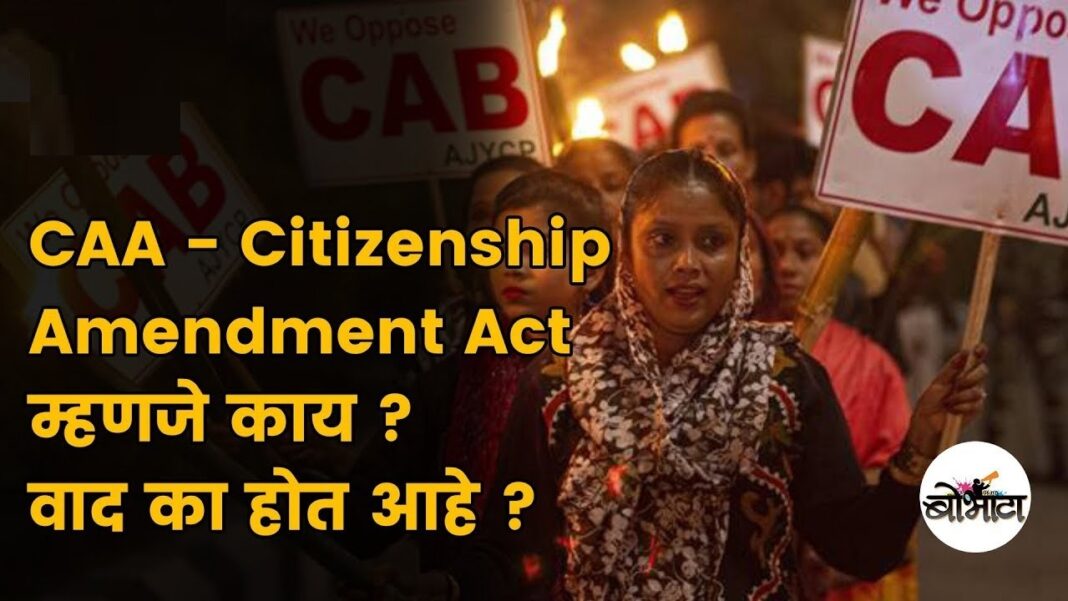What is CAA,Citizenship (Amendment) Act 2019: What is this and why it is seen as a problem.
Introduction of CAA.
Friends, welcome to Amarjulas again today, today’s topic is what CAA is and why people are protesting it. So friends, I will give you complete information about caa, so you should read this post completely so that you too can get to know the information right after all, what is CAA?
Protests across India, some of them turned violent, against the Citizenship (Amendment) Act 2019. The act calls for amending the definition of illegal asylum for Hindu, teaching, Parsi, Buddhist and Christian religions for Pakistan, Afghanistan and Bangladesh. Who have been in India without documentation. He will be given fast track Indian citizenship in six years. Until now, naturalization of a 12-year residence requires standard eligibility.
In the first hearing on the petitions challenging the CAA, the Supreme Court refused to stay the controversial law, but asked the Center to file its reply against the petitions, stating that it was a violation of the constitution. The petitioners maintain that the Bill discriminates against Muslims and violates the right to equality enshrined in the Constitution. Here is a primer.
Who makes the cut?
This law applies to those who were forced or forced to seek refuge in India due to persecution on the basis of religion. Its purpose is to protect such people from illegal migration proceedings. The cut-off date for citizenship is December 31, 2014, meaning that the applicant must enter India on or before that date. Indian citizenship, under the existing law, is granted either to those born in India or if they reside in the country for mi.
What is Centre’s reasoning behind the bill?
The Center says that these minority groups have survived persecution in Muslim-majority countries. However, the argument is not consistent – the bill does not protect all religious minorities, nor does it apply to all neighbors. The Ahmadiyya Muslim sect and even Shia face discrimination in Pakistan. Rohingya Muslims and Hindus face persecution in neighboring Burma, and Hindu and Christian Tamils in neighboring Sri Lanka. The government responded.
Some say it is like division, is it true?
Amit Shah says that the bill would not have been necessary if the Congress had not agreed to a division on the basis of religion. However, India was not built on the basis of religion, Pakistan was. Only the Muslim League and the Hindu Right advocated the two nation theory of Hindu and Muslim nations, which led to the partition. All the founders of India were committed to a secular state where all citizens, irrespective of religion.
How much of North East does the bill cover?
The CAB will not apply to the areas covered under the Sixth Schedule of the Constitution – which deals with autonomous tribal dominated areas in Assam, Meghalaya, Tripura and Mizoram. This bill will also not apply to those states which have Inner-Line Permit Governance (Arunachal Pradesh, Nagaland and Mizoram).
Why is Assam angry about this?
Among the northeastern states, resentment against the CAG is most acute in Assam. While a portion of these states are exempted from the law, the CAB oversees a large part of Assam. The protest comes from the fear that illegal Bengali Hindu immigrants from Bangladesh, if regulated under the CAB, would threaten the cultural and linguistic identity of the state.
Isn’t it like NRC?
The National Register of Citizens or NRC that we saw in Assam targeted illegal immigrants. A person had to prove that either he or his ancestors were in Assam on or before 24 March 1971. The NRC, which can be extended to the rest of the country, is not based on religion unlike the CAB.
What is the logic of the opposition?
The CAB created a Muslim identity by declaring India a welcome refuge for all other religious communities in India. It seeks to legally establish Muslims as second class citizens of India by providing preferential treatment to other groups. It violates Article 14 of the Constitution, the fundamental right to equality to all individuals. This basic structure of the Constitution cannot be reconstructed by any Parliament. And yet, the government says that ..
What will be the protest after this move of the government?
The President gave his assent to the Citizenship (Amendment) Bill, 2019 on 12 December 2019, a day after it was passed by the Rajya Sabha. However, the Ministry of Home Affairs is yet to notify the rules for the operation of the law. The notification of the rules may now have to wait for a decision in this regard after consultation with experts as the matter is sub-judge before the Supreme Court.


